
Godflesh are an English industrial metal band from Birmingham. The group formed in 1982 under the original title O.P.D. but did not release any complete music until 1988 when Justin Broadrick and B. C. Green (bass) renamed the band and decided to use a drum machine for percussion. Melding heavy metal with industrial music and later with electronic music and dub, Godflesh's sound is widely regarded as a foundational influence on other industrial metal and post-metal acts and as significant to both experimental and extreme metal.

Neurosis is an American avant-garde metal band from Oakland, California. It was formed in 1985 by guitarist Scott Kelly, bassist Dave Edwardson, and drummer Jason Roeder, initially as a hardcore punk band. Chad Salter joined as a second guitarist and appeared on the band's 1987 debut Pain of Mind and then Steve Von Till replaced him in 1989. The following year, the lineup further expanded to include a keyboardist and a visual artist. Beginning with their third album Souls at Zero (1992), Neurosis transformed their hardcore sound by incorporating diverse influences including doom metal and industrial music, becoming a major force in the emergence of the post-metal and sludge metal genres.
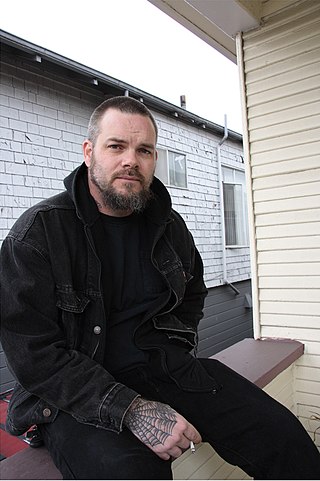
Scott Michael Kelly is an American former musician. He was one of three founding members of California experimental metal band Neurosis, in which he was the band's lead vocalist and guitarist from its formation until his firing in 2019. Kelly retired from music in 2022 after admitting to many years of physically abusing his family.

Streetcleaner is the debut studio album by English industrial metal band Godflesh. It was released on 13 November 1989 through Earache Records and was reissued with a second disc of previously unreleased material on 21 June 2010. The album is widely acclaimed by critics and is often cited as a landmark release in industrial metal; though not the genre's first release, Streetcleaner helped define what industrial metal would become.
Post-metal is a music genre rooted in heavy metal but exploring approaches beyond metal conventions. It emerged in the 1990s with bands such as Neurosis, Godflesh, and Helmet, who transformed metal texture through experimental composition. In a way similar to the predecessor genres post-rock and post-hardcore, post-metal offsets the darkness and intensity of extreme metal with an emphasis on atmosphere, emotion, and even "revelation", developing an expansive but introspective sound variously imbued with elements of ambient, noise, psychedelic, progressive, and classical music. Songs are typically long, with loose and layered structures that discard the verse–chorus form in favor of crescendos and repeating themes. The sound centres on guitars and drums, while any vocals are usually screamed or growled and resemble an additional instrument.
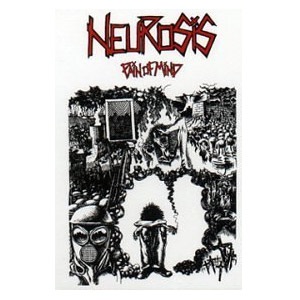
Pain of Mind is the debut studio album by Californian band Neurosis, originally released on Alchemy Records in 1987. It was later reissued by Alternative Tentacles in 1994 and by Neurot Recordings in 2000; the 2000 reissue contains a special bonus disc that includes live tracks, live radio tracks, and demo tracks. Pennsylvanian politician Budd Dwyer is pictured on the front cover of the 1994 vinyl release, moments before he committed suicide during a televised press conference in 1987.
Tribes of Neurot is an American experimental music group formed by the members of Neurosis in 1995. Their music incorporates tribal sounds into ambient atmospheres.

Blessed Black Wings is the third studio album by American heavy metal band High on Fire. It would be the only with Joe Preston on bass who would be replaced by Jeff Matz.

Souls at Zero is the third studio album by the American avant-garde metal band Neurosis. It was released in 1992 by the Alternative Tentacles record label. It was reissued in 1999 with bonus tracks on the band's own Neurot Recordings label. On February 15, 2010, the album was reissued on CD and digitally with new artwork by Neurot. On February 14, 2012, a fully remastered version was released on vinyl by Relapse Records. The album was deducted into Decibel Magazine's Hall of Fame in August of 2016.
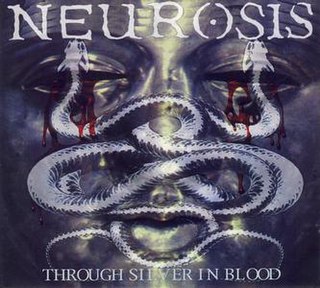
Through Silver in Blood is the fifth album from the American avant-garde metal band Neurosis. The album was released on April 2, 1996, and was their first record to be released through Relapse Records. The album was reissued in July 2009 on the band's own label, Neurot Recordings. Since its release, Through Silver in Blood has been recognized not only as the band's critical and popular peak, but as one of the sources of post-metal and as one of the best metal albums of all time.

Neurosis & Jarboe is a collaboration between American avant-garde metal band Neurosis and singer-songwriter Jarboe formerly of Swans. It was released on October 21, 2003 by Neurot Recordings. On August 2, 2019, the album was re-released on Neurot Recordings. The 2019 version was remastered by Bob Weston with new artwork by Aaron Turner.

Aaron Turner is an American musician, singer, graphic artist, and founder of label Hydra Head Records. He is most widely known for his role as guitarist and vocalist for the post-metal bands SUMAC and Isis, while also participating in several other bands and projects such as Old Man Gloom, Lotus Eaters and Split Cranium, a collaboration with Jussi Lehtisalo of Finnish band Circle who toured with Isis in 2009.

Given to the Rising is the ninth studio album by American band Neurosis, released on June 5, 2007. The album is available in a standard jewel case, a limited-edition digipak, and a limited-edition double LP, all with the same track list. Decibel Magazine listed Given to the Rising as the 76th-best metal album of the decade. A DVD documentary is also available from Neurot Records. The artwork for the album, designed by Josh Graham, is a mixture of photos from Heroes Square in Budapest and drawings inspired by the place. Coincidentally, singer/guitarist Steve Von Till and Josh Graham had separately thought of the idea of using Heroes Square as the artwork for the album.

Sovereign is an EP by Californian band Neurosis. As with the previous album, Times of Grace it was recorded by Steve Albini at Electric Audio in Chicago, Illinois. The CD contains a mixed-media CD-Rom portion featuring visuals and music reminiscent of their live shows and their work under the Tribes of Neurot moniker. In 2011 Neurot Recordings released a reissue that includes bonus track "Misgiven".
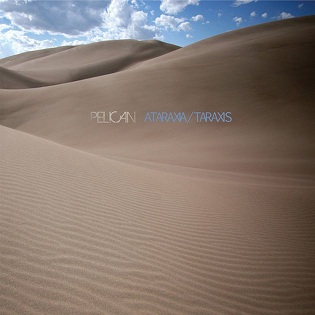
Ataraxia/Taraxis is the fifth EP by American post-metal band Pelican, released through Southern Lord Records on April 10, 2012. Ataraxia/Taraxis was Pelican's final release to include founding guitarist Laurent Schroeder-Lebec.

Jason Roeder is the drummer of the Oakland-based metal bands Neurosis and Sleep.
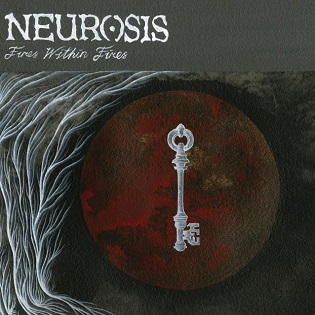
Fires Within Fires is the eleventh studio album by American post-metal band Neurosis. The album was released on September 23, 2016, via the band's own record label, Neurot Recordings. Recording began on December 27, 2015, at Electrical Audio Studio; the album was produced by Steve Albini and the cover art created by Thomas Hooper. Like Neurosis' previous albums, Fires Within Fires combines "elements from the post-metal genre they co-created [with] elements of industrial, doom, punk and folk". This is the band's final album with founding member Scott Kelly who was fired in 2019 due to domestic abuse allegations, which he officially confirmed to be true and announced his withdrawal from the public eye in August 2022.

Locust Star is a split EP between Oakland bands Neurosis and Tribes of Neurot released in 1996 through Relapse Records as a CD and a promo. Unlike most split releases, both groups involved with this EP are composed of the same members.
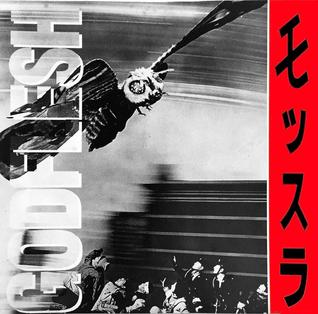
"Mothra" is a song by English industrial metal band Godflesh. It was taken from their 1992 album Pure and saw release as a radio promo and music video in the same year. The track's title is derived from 1961 Japanese film of the same name by Ishirō Honda. Musically, "Mothra" is a grinding, mechanical song with shouted vocals and heavily distorted instruments.





















